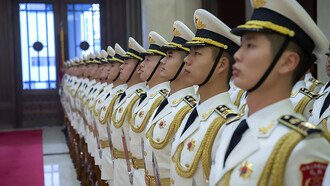Between October 18 and 26, for the first time since the end of the dictatorship, curfew was imposed in Santiago and other cities across the country. Due to the explosion of violence caused by the increase in the subway fare, by October 28, 20 people had died, 1,092 were injured -546 of them by firearms- with 3,193 people detained by the police. Of the 136 subway stations in the capital, 79 were affected, 10 of them burned long awith 5 trains. 335 supermarkets were looted in the country and 31 were burned, as well as 20 buses, many neighborhood businesses, some bank branches, factories, pharmacies and a hotel. The approximate cost of the damage and theft is estimated at around two billion dollars. On October 25, 1.2 million people marched peacefully in Santiago to say enough to a system based on the principles of neoliberalism. The massive marches were replicated in the main cities of the country. Chile lives the complexities of the problems not solved by politics.
End of an era
The violent awakening of Chilean society marks the end of a cycle initiated with the Pinochet dictatorship in 1973 and that shaped in a few years what is now known as the neoliberal system. The model, driven by economists trained at the University of Chicago, freely disposed of an entire country, as a huge laboratory, to experiment and impose an economic policy that dismantled the Chilean productive structure. Then was initiated a process of privatization of natural resources, public companies, health, education, pension system, together with unilaterally lowering tariffs and opening the economy to free trade. Although it generated sustained economic growth, it also concentrated wealth creating great inequality. The application of this unprecedented experience in the world was made possible by the imposition of a violent military dictatorship that ended in 1990, when the country was democratized, but left the model firmly tied in the 1980 Constitution, in place until today.
Since the return of democracy, the country has had five center-left and two center-right governments. The first 20 years, from 1990 to 2010, Chile was ruled by the same progressive coalition, which extended to the communist party in 2014 and ruled four more years. However, the hopes of changes longed for by two generations have been frustrated. It is too early to emit a historical trial, but it is worth looking for explanations to try to understand the reason for the deep discomfort incubated in Chilean society and that has caused this great social explosion that seems to mark the end of an era in the history of country.
Dictatorships
Many countries have suffered cruel dictatorships: Germany, Italy, Spain, Greece or Portugal, among others, in addition to the former Soviet Union and Eastern European countries. In Latin America they have been numerous, and the traumas left in societies are multidimensional, but they differ from Chile in substantial aspects. The dictators have left power either by military defeats, escaping, or natural/provoked death. Whereas in Chile, Pinochet, with all his crimes, continued as commander in chief of the Army and then as a designated senator.
After being arrested in London and when there was a possibility that he was extradited and tried, the ruling coalition did everything possible to prevent this, and he managed to end up returning home, being received as a hero and with honors by the army, the event being transmitted in direct on television. The obvious question is how this situation was possible. The first answer is a question: Why were Pinochet's conditions accepted on the occasion of the 1989 presidential election, after he had been defeated in the 1988 plebiscite and his international isolation was almost total, most of the country did not want him, and even the United States wanted him to leave?
The democratic forces negotiated with his Government a package of 54 constitutional reforms without the dictator agreeing to touch the heart of the Fundamental Charter, in circumstances that he had been categorically defeated. It is true that there were very hard years of repression, and today it is easy to make judgments. However, this was the key moment, crucial, decisive, and it has marked the course of what have been the five center-left governments in Chile. Too little time has elapsed to have a cold and historical vision of what happened, when in addition many of the actors in the transition process are alive, and some still active in politics.
After the surrender of Germany, in 1945, it never occurred to anyone to speak of the "pre-war context" -as is done in Chile- nor that Hitler built up a destroyed economy, ravaged by inflation, or that he made build the highways. The businessmen and a large part of German society assumed their faults and responsibilities for having supported a tyrant like Hitler, and to this day the country’s rulers ask for forgiveness.
In Spain, Greece, Italy and Portugal, with nuances, the situation was similar and most importantly, at the end of these regimes, a consensus was generated regarding the drafting and effective implementation of a new Constitution. This represented the best form of reunion and tolerance, where the representation of all inhabitants was ensured and with it the national interest protected. In Chile, on the other hand, a powerful denial sector was immediately raised, which also claimed the ultraliberal economic model imposed, obviating violations of human rights and lack of freedom.
They even convinced many people that there had been no coup d’état but rather a "military pronouncement" and naturally entrenched themselves in defense of the Constitution that guaranteed the political and economic system of the dictatorship. A preliminary explanation may be that, by accepting the conditions of Pinochet to initiate the transition, including the electoral system that warned about what would happen by having designated senators, implicitly legitimized his government, his Constitution and especially his economic reforms, including privatizations "between roosters and midnight", as they say in Chile.
The model
Good parts of the big businesspersons and the media that justified and endorsed the coup, duly represented in Parliament, have been the custodians of the model and defenders of the 17-year military regime. They did not want Pinochet to leave, but instead sought to continue governing. It was understood that the repression was part of the recipe to transform the Chilean economy without the hassle of unions or intermediaries. President Sebastián Piñera synthesized it very well by characterizing them as "passive accomplices," who silenced and endorsed the military dictatorship, despite the fact that he was an active defender of the tyrant when he was imprisoned in London.
Then came the first democratic government and of course, it was not easy to carry out major reforms with Pinochet in the Army, then in the Senate, and with the legislative control exercised by the appointed senators. But the truth is that not everyone was convinced of the need to substantially modify the economic regime imposed by the dictatorship. In addition, foreign investment flowed generously to a country where a sort of backhoe had spent time dismantling much of the productive structure and privatizing key sectors of the economy in the dark.
The new democratic administration immediately obtained international political recognition, guaranteed the legal security of an economic system that had not been touched, deepened the country's economic opening and the social peace that was imposed. The economy began to grow steadily and a lot, which filled the businesspersons with pride -who thereby reaffirmed the model- and those who ruled - who showed they knew how to manage. From President Aylwin's words of “justice as far as possible” in relation to human rights violations, a great “everything, as far as possible” was passed, substantially lowering expectations of changes.
In the 24 years they ruled, the five center-left governments did many positive things starting with reducing poverty, eliminating designated senators, terminating the immobility of commanders in chief, initiating changes in education and a long list of other measures. However, and despite the 20 times that the Constitution has been reformed, its core aspect left by Pinochet has never been touched, maintaining the principle of subsidiarity, a fundamental pillar of the economic model. The votes have not attended; it is true, but neither the deep conviction -except exceptions- neither in the electoral nor in the parliamentarian programs.
In the first 20 years and the additional four, we have seen how the private pension and health system has been strengthened; until today the water is still in the hands of a few. The awakening of Chilean society has brought back the debate for a new Constitution that will only be possible to change if conservative sectors accept it. Despite the economic growth, an important part of society drags a long list of frustrations that ended, in addition, with opening a political space to new movements of young people who lost hope in traditional parties, despite the fact of their merit of having organized, mobilized and defeated the dictatorship in the plebiscite.
A Constitution
In short, all governments since 1990 have swept under the carpet the central and unresolved problems that maintain the social fracture and hinder a real reunion to advance in the effective closure of the wounds that marked the history of Chile. The need for a new Constitution should be a priority for the left, the center and the right, such as seeking an acceptable solution to the Mapuche issue, assuming the depth of the causes of crime, or strengthening the political system that shows severe indications of exhaustion. These are issues of national interest and require a very large effort from all political sectors. Should Chile expect another social outbreak? What else must happen in Araucanía in order to find a global solution to the conflict? How far have crime and drug trafficking to go to get to the root that originates it? Are you going to expect the crisis that will inevitably come between the Supreme Court and the Constitutional Court? The problems of memory are relentlessly pursuing societies, as we can see in the case of Spain, where the remains of the dictator Franco were finally exhumed after 44 years since his death and 80 after the end of the civil war.
The return to democracy in Chile coincided with the fall of the Berlin Wall, the renewal of the social democratic discourse, globalization, the emergence of the third way that enshrined the liberalization of financial circuits and the beginning of the rapid accumulation of wealth worldwide and in Chile in particular. According to the publication of Forbes for the year 2019, our country, with only 18 million inhabitants, has 11 billionaires that accumulate 37.3 billion dollars, equivalent to approximately 12.5% of the country's GDP. And for sure there are more than eleven, an outstanding connoisseur of the national reality assured me. The publication shows that larger countries like Argentina register only five, Colombia, three, and Peru, six. The sum of the wealth of these last three groups of billionaires amounts to 39.2 billion, that is, they barely outnumber Chileans. In the list of Fortune magazine, from 1990, no Chilean appears.
The past cannot be changed, but it is possible to build the future in a different way and give opportunities for growth to pass to the stage of development. A social consensus must be generated to give Chile first a modern, inclusive constitution and in accordance with the challenges that the country will face at all levels. The magnitude of the changes that are required will not be resolved without greater State participation, as has been done and it is the reality in developed countries. This should not be a problem of rights or lefts, nor of government and opposition, but of national interest and security. It is the decisive and necessary step to advance towards a society with more equal opportunities. The per capita income indicator, which makes some people so proud, is of little use when the streets of the center of the main cities are filled with vendors, clowns or jugglers begging for coins. You can add that elderly are barely surviving, drug lords taking over whole neighborhoods, the increasingly violent crime and the young people from popular sectors being left, with no prospects for the future.















